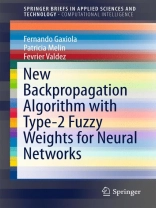In this book a neural network learning method with type-2 fuzzy weight adjustment is proposed. The mathematical analysis of the proposed learning method architecture and the adaptation of type-2 fuzzy weights are presented. The proposed method is based on research of recent methods that handle weight adaptation and especially fuzzy weights.
The internal operation of the neuron is changed to work with two internal calculations for the activation function to obtain two results as outputs of the proposed method. Simulation results and a comparative study among monolithic neural networks, neural network with type-1 fuzzy weights and neural network with type-2 fuzzy weights are presented to illustrate the advantages of the proposed method.
The proposed approach is based on recent methods that handle adaptation of weights using fuzzy logic of type-1 and type-2. The proposed approach is applied to a cases of prediction for the Mackey-Glass (for ô=17) and Dow-Jones time series, and recognition of person with iris biometric measure. In some experiments, noise was applied in different levels to the test data of the Mackey-Glass time series for showing that the type-2 fuzzy backpropagation approach obtains better behavior and tolerance to noise than the other methods.
The optimization algorithms that were used are the genetic algorithm and the particle swarm optimization algorithm and the purpose of applying these methods was to find the optimal type-2 fuzzy inference systems for the neural network with type-2 fuzzy weights that permit to obtain the lowest prediction error.
Spis treści
Introduction.-Theory and Background.- Problem Statement an Development.- Simulations and Results.- Conclusions.












